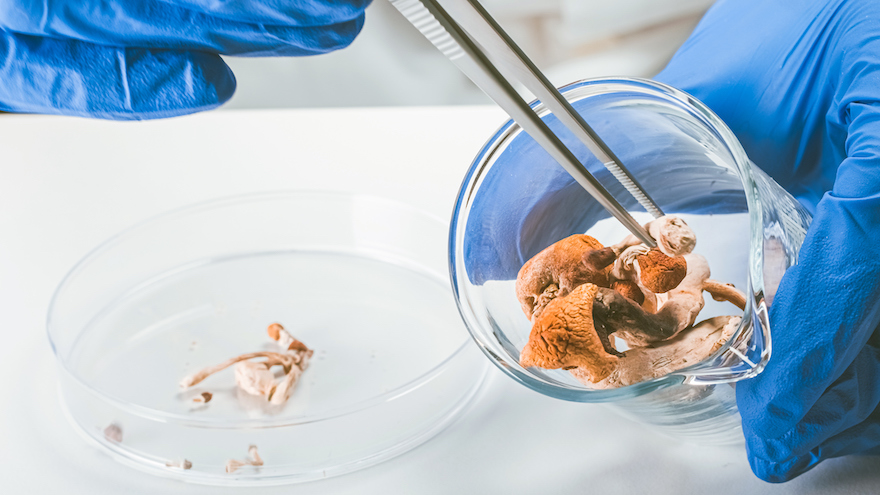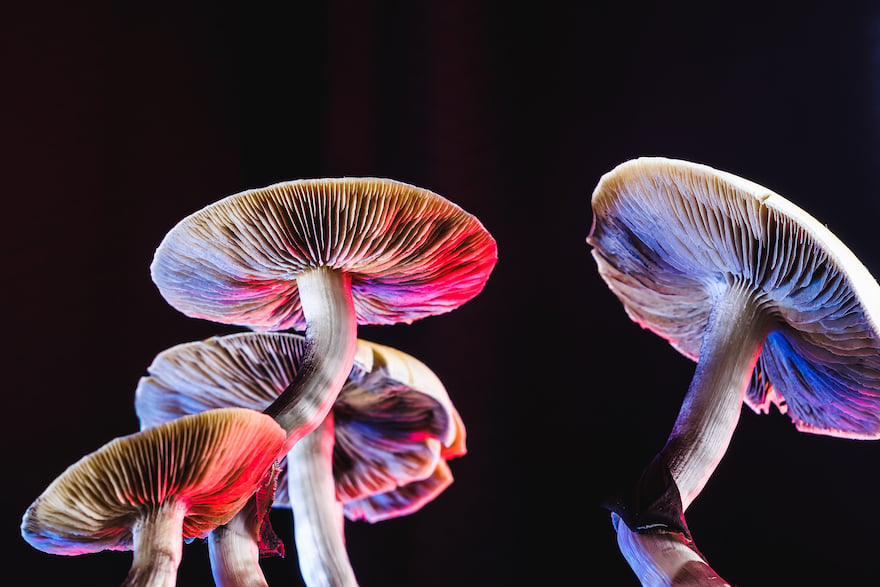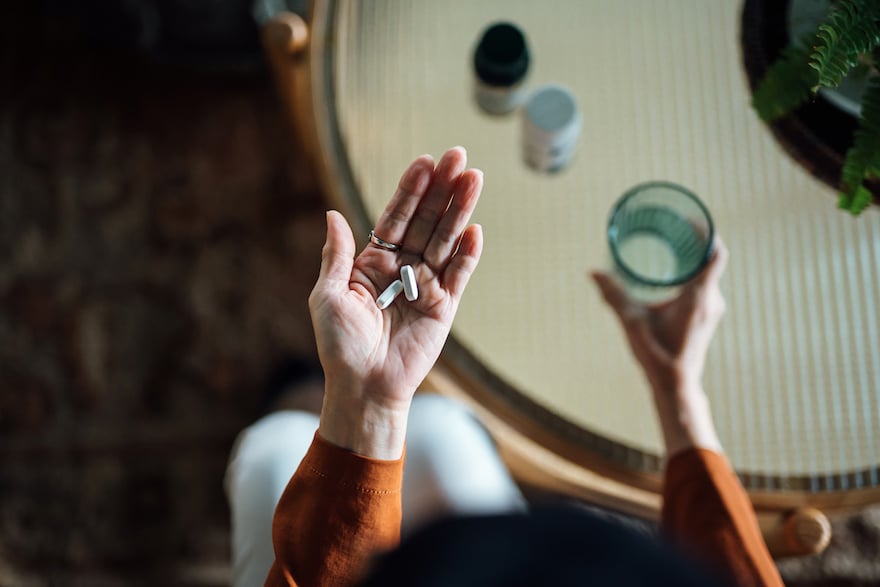Difficult-to-treat mental health and medical conditions may have finally met their match. Here, we dive into the world of psychedelics for mental health.
Imagine walking into your therapist’s office and being prescribed magic mushrooms, LSD, or another hallucinogen to help you work through your problems. It sounds trippy, but it just might be a reality in the not-too-distant future. Once considered fringe—and still illegal in most of the U.S.—psychedelics are currently undergoing clinical trials with some of the biggest names in medicine, like Johns Hopkins, exploring their mind-opening possibilities. There’s even one drug that produces psychedelic effects, ketamine, that clinicians around the country are using with greater frequency in conjunction with psychotherapy to combat traditional treatment-resistant psychiatric conditions.
Since psychedelic-assisted therapy appears to provide relief to people who don’t respond to traditional medication or therapy, it’s easy to see why researchers are intrigued. Plus, psychedelics work quickly, their effects are long-lasting, and they have minimal to no side effects. Why are they so effective? Experts theorize that they release the brain from operating in its normal grooves, according to Greg Fonzo, PhD, co-director of the Center for Psychedelic Research and Therapy at the University of Texas at Austin’s Dell Medical School. These grooves are created by repetitive thoughts or trauma, kind of like water running down a hill that follows the same well-worn path. “Psychedelics seem to level the playing field, so to speak, allowing for the brain to operate in new and different ways,” Dr. Fonzo explains. “This may provide individuals with an opportunity for a mental ‘reset’ and subsequent establishment of different ways of thinking, feeling, and relating to the world.”
While this may seem pretty far out, the psychedelic movement has been underway for decades. In fact, various psychedelics were used in therapy in the 1950s and ‘60s—not to mention in indigenous rituals for thousands of years. But with the rise of the hippie counterculture movement and the potential for abuse, psychedelics got a bad rap and were ultimately classified as Schedule I drugs in 1970, putting an effective end to their use in medical and research settings.
But with changing attitudes about both substances and science, psychedelics are back—and they have the potential to revolutionize medicine. Here’s what you need to know about psychedelics and mental health, from the conditions they may be able to treat to their current legal status.
What Are Medical Psychedelics?

Medical psychedelics are exactly what they sound like—psychedelics used specifically in medical settings. Of course, you shouldn’t just pick up any psychedelic off the street or in nature (even if that were legal, which it is not). “All of the current compounds utilized in research are synthetically derived, as opposed to naturally derived compounds [like you’d find in] psilocybin mushrooms,” explains Dr. Fonzo, noting that this ensures the purity of the product and that doses are standardized for clinical studies. “But from a purely chemical perspective, the molecules should be the same.”
Here’s what psychedelic mental health treatment might look like: After preparatory psychotherapy sessions, a psychedelic is administered by a therapist in a carefully-controlled and cozy setting. It’s generally ingested, though ketamine may also be given via injection or nasal spray. Dr. Fonzo says that patients are encouraged to wear eyeshades and listen to preselected music while turning their attention inward and focusing on the effects of the drug. Facilitators will check in to see if the patient requires any emotional or psychological support navigating the experience, and then afterward, therapists will conduct integration psychotherapy sessions.
That combination of psychedelics and psychotherapy is “the magic sauce,” says Mike Dow, PhD, PsyD, a psychotherapist at Field Trip Health, which offers ketamine-assisted therapy, and the author of The Brain Fog Fix. “Mental illness is a complex disease that requires bio-psycho-social-spiritual approaches for true root-cause healing,” he explains. “Medication or IV ketamine addresses the [biological aspect] without the psycho-social-spiritual; talk therapy does the opposite. Psychedelic-assisted psychotherapy hits all four quadrants.”
How Does It Feel to Take a Psychedelic For Mental Health?
In a word, trippy. While the experience will be different for everyone, those who use psychedelics for mental health often report a dissociative feeling, sort of like they’ve moved outside of their body and are looking at themselves from a distance. Others describe the experience as “mystical,” “calming,” or “euphoric,” according to Field Trip Health’s website.
But it can also be disorienting and confusing, which is why trained mental health professionals guide patients along the way. If someone has taken psychedelics outside of a medical setting, they may want to look into integration therapy—technically known as psychedelic harm reduction and integration (PHRI)—which helps them sort through the feelings brought up during their experience.
What Psychedelic Drugs Are Being Studied Now?

- Psilocybin: The main component in magic mushrooms, psilocybin is found in more than 200 types of fungi. It is one of the most popular psychedelics in clinical trials right now, showing promise in everything from depression to addiction treatments.
- MDMA: MDMA rolls off the tongue a lot easier than methylenedioxymethamphetamine, but you might know it by its street names, ecstasy, and molly. While it’s known for promoting feelings of euphoria and boosting the sense of touch, research indicates that it can be used effectively in combating PTSD.
- LSD: The full name of this psychedelic is lysergic acid diethylamide (aka “acid”), and it’s the mind-altering drug that was favored by hippies in the ‘60s. It was developed in 1938 by a scientist in Switzerland, and in 1947, it was incorporated into treatments for neurosis, alcoholism, schizophrenia, and more.
- Peyote: Used in spiritual ceremonies and rituals by indigenous populations, including Native Americans, peyote comes from the top of a small cactus. Also called mescaline, it can be chewed on or steeped in hot water to create tea, which, in turn, produces hallucinations. While preliminary research suggests that it could help with depression and anxiety, it hasn’t been studied as extensively as other medical psychedelics.
- Ketamine: Arguably in a class by itself, ketamine was originally used (and is still used) as a general anesthetic. Medical professionals also use it for treatment-resistant depression, though this is an “off-label” use (meaning that it is legal but not approved by the FDA).
What Conditions Can Psychedelic Therapy Treat?

When it comes to psychedelic-assisted psychotherapy, it’s a little like the Wild West right now. There has been an enormous influx of money into psychedelic research programs around the country for nearly every mental health condition you can think of, along with a few physical ones. Below are some of the most promising potential applications.
PTSD
Around two-thirds of people with PTSD don’t respond to traditional treatments with medications like Zoloft, Paxil, and Prozac. Psychedelics appear to have a much higher success rate. One Phase 3 MDMA study published in Nature Medicine in 2021 found that 88 percent of those in the trial experienced a significant improvement of symptoms—with 67 percent no longer meeting the criteria for having PTSD once the protocol of MDMA-assisted psychotherapy was over. Other studies highlight ketamine’s success with treatment-resistant PTSD.
Another benefit: You don’t need to take a pill every day. “The benefits of MDMA-assisted psychotherapy can last a year or, in some cases, forever,” says Dr. Dow. “Ketamine-assisted psychotherapy tends to last for months. Most patients prefer this dosing schedule over daily medication.”
Depression and Anxiety
Nearly all psychedelics appear to have positive effects on both depression and anxiety. Ketamine is currently leading the way in the United States since it can be legally prescribed and numerous studies have observed its success in this arena. It relaxes the brain, deactivating its default network and lifting dopamine, serotonin, and GABA levels. With ketamine-assisted therapy, Dow notes, the relief is “significant, rapid, and robust.”
Psilocybin is another major player in the field of medical psychedelics, with recent studies in the New England Journal of Medicine and Nature Medicine highlighting its success against major depression. And this isn’t magic, as the term magic mushrooms might have you believe. While traditional antidepressants (or SSRIs) boost serotonin levels, psilocybin appears to work by increasing connectivity between neurotransmitters at the serotonin 2A receptors—getting them to “talk” to one another. Researchers say this connectivity characterizes a brain without depression.
While the medical reasoning behind using psychedelics drugs for mental health may be complicated and still being studied, the result seems to be more clear-cut: When combined with psychotherapy, psychedelics seem to alleviate depression by changing the way your brain functions instead of just putting a proverbial Band-Aid on the problem.
Addiction
It may seem counterintuitive to treat a drug addiction with another drug, but when you’re talking about psychedelics, you have to open your mind. A number of studies on psilocybin, LSD, and ketamine report success in treating various forms of addiction, including alcohol, nicotine, and harder drugs like cocaine and even opioids.
“Ketamine, LSD, and psilocybin have case reports and research that support them being used as anti-addiction drugs—providing the insight, spiritual ‘aha’ moments, and ‘resetting’ the brain,” says Dr. Dow. “We have case reports of our patients never drinking again after ketamine-assisted psychotherapy. That being said, it has to be used with caution and as part of a treatment plan.”
Eating Disorders and Obesity
Similar to psychedelics’ potential to combat addiction, they may also help those dealing with obesity and other eating disorders, including anorexia. It all goes back to the idea of rewiring the brain and making patients more open to therapy. “I have personally seen the protocol work wonders when people are overeating as a means of self-medicating their depression and anxiety,” says Dr. Dow. “By treating the root cause, the weight loss becomes possible.”
Cluster Headaches and Chronic Pain
There are headaches and migraines…and then there are cluster headaches. These extreme, long-lasting headaches are often misdiagnosed, not well understood by researchers, and resistant to medication. Now, some people are turning to psilocybin and LSD for “clusterbusting,” which they say is the only thing that helps. While research has been limited to date, one study that relied on self-reporting found that psychedelics appeared to stop the headaches or extend breaks between them.
Researchers are also interested in psychedelics to treat other types of chronic pain, such as fibromyalgia, degenerative disc disease in the spine, and phantom-limb pain.
Alzheimer’s Disease
Researchers are curious about psychedelics’ potential to treat this degenerative neurological disease that doesn’t currently have a cure or even an effective treatment. Since psychedelics appear to enhance neural connectivity, reduce inflammation, increase brain plasticity, and improve cognition, they could be the perfect fit for treating Alzheimer’s. Some early research has been focusing on psilocybin and LSD.
While researchers haven’t yet conducted advanced trials with cognitively impaired adults, an observational study of recreational users did show improved creativity, attention, and cognition after microdosing, “with a sustained improvement over six weeks.”
Are Medical Psychedelics Legal?
An important note: with the exception of ketamine, all medicinal psychedelics are legal only in the context of a clinical trial. These drugs fall under Schedule I of the DEA’s classification, which means that they have been deemed without medical purpose and with a high potential for dependency and abuse. Ketamine, on the other hand, is designated as a Schedule II drug (in the same category as Tylenol with codeine in terms of dependence risk).
Change, however, may be on the horizon. Since 2019, a handful of cities, including Denver and Oakland, California, have decriminalized certain psychedelics. And in 2020, Oregon became the first state to legalize the use of psilocybin in therapy. For the past two years, the Oregon Health Authority has been working on plans to roll out “service centers” in 2023. What happens next in Oregon has the potential to affect psychedelic legality throughout the country.
Rules are more relaxed abroad. In fact, in some countries, including Jamaica, Mexico, and Costa Rica, you can visit psychedelic retreats. Dr. Dow also notes that the Field Trip Health clinic in Amsterdam already offers psilocybin-assisted therapy, though in the United States and Canada, only ketamine is allowed.
Guidelines for Safe Psychedelic Therapy
As mentioned earlier, you shouldn’t obtain psychedelics on your own to self-medicate. Instead, the best place to explore your options would be to look into participating in a clinical trial or visiting a reputable ketamine clinic like Field Trip Health. It is essential to be under the care of a professional, as well as talk with your regular doctor first.
In general, doctors recommend avoiding this treatment if you have a history of psychosis, uncontrolled hypertension, or other cardiovascular conditions. The two latter issues may be problematic, says Dr. Fonzo, because most psychedelics elevate heart rate and blood pressure. You’ll also want to avoid a treatment like this if you’re pregnant or breastfeeding.
And while one of the benefits of psychedelics is the lack of side effects, you may experience a headache shortly after your “trip.” Dr. Fonzo says that if you do experience this symptom, it will start and resolve itself within a day or two after you take the psychedelic.
Looking Ahead
Researchers still have a lot to learn about psychedelics, but they seem promising, especially for people who feel they have run out of options. And while there’s so much up in the air in terms of the science and legality of these drugs, one thing seems certain: Psychedelic therapy is here to stay.









